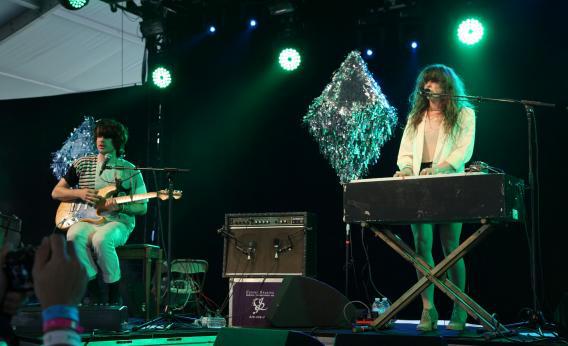Recently, two ad agencies representing popular brands have been accused of pilfering songs by admired indie bands. The music in a British ad for Volkswagen appears to borrow heavily from the Beach House song “Take Care,” while, here in the U.S., T.G.I. Friday’s scored an ad with something that sounds an awful lot like “Daft Punk is Playing at My House” by LCD Soundsystem. These are only the most recent incidents in a long and dubious tradition of advertisements that blatantly copy popular music in order to sell a product. Why do so many of these less-than-flattering imitations seem to steal from the world of indie rock?
I spoke with musicologist Matthew Harris, who specializes as a consultant on “music for broadcast.” (His company, Harris Musicology has evaluated thousands of compositions for plagiarism.) Harris believes the main reason is simple: Many advertisers are trying to reach a young, hip demographic—and indie music strikes these advertisers as an obvious way to do so. I asked him if these bands were also easier targets, given that they presumably lack the deep pockets to mount a successful lawsuit against a large corporation or ad agency. But Harris doesn’t think the agencies are taking that into consideration. He points out that agencies have often imitated songs by mainstream commercial acts as well—and frequently gotten in trouble for it, too.
Bette Midler set a precedent in 1985 when she successfully sued Ford for hiring her former backup singer to imitate her recorded version of the song “Do You Want to Dance” for their ads after she declined their offer. The less mainstream but still quite high-profile singer/songwriter Tom Waits, renowned for his distinct, gravelly vocal stylings, has since had frequent run-ins with ad agencies who have imitated his music for their clients’ products. In 1988, he successfully sued Frito-Lay and its ad agency Tracey-Locke Inc. for “misappropriating” his voice in a Doritos ad that mirrored his song, “Step Right Up,” and he was victorious again a few years later in a suit against Volkswagen-Audi, whose Spanish ads were scored to an “Innocent When You Dream” imitation. More recently, an Audi commercial that not only sounded like the instrumental backing for Eminem’s hit “Lose Yourself” but also employed a similar look as the rapper’s Chrysler commercials (which featured the actual song) led to a settlement with the popular hip hop artist.
Harris likens such cases to selling a fake Rolex: If a customer buys the watch under the assumption that it comes from that brand, it’s false advertisement. Similarly, Waits and Midler, whose careers are built upon their voices, have ownership over their distinctive sound, and selling a product with their fake likeness acts as a false endorsement.
How does a judge determine whether the imitation counts as copyright infringement? There are no hard and fast rules, Harris explained. While some people believe that a certain number of like notes or bars is taken as the standard criteria for a decision, this is mistaken. It can all be very subjective, Harris says.
Are such indie acts are more likely to get ripped off for the simple reason that they’re less likely to license their music for ads? Harris said he finds that possibility unlikely. The stigma behind bringing advertising and pop music together has long faded, he points out; many lesser-known musicians have eagerly licensed their work for marketing purposes. Spinto Band licensed their music to Sears so they could help fund a tour for their growing European fanbase, while the band of Montreal licensed its songs for use in Nasdaq and Outback Steakhouse commercials.
Granted, of Montreal got some flak for “selling out”; frontman Kevin Barnes even composed an essay explaining why that’s an inaccurate description for what they did. And of course there are still indie bands uninterested in licensing their music to agencies, despite the lucrative opportunities. Sigur Rós has been adamant about staying away from ads, though they have been imitated many times in commercials, and have occasionally called out the offending agencies on their blog. But such bands now seem to be the exception, not the rule.
According to Harris, most incidents of copyright infringement are settled out of court. And it’s hard to say whether Beach House or LCD Soundsystem would have a legal case. Though Beach House has a leg up: In circumstances where the artist was initially contacted for permission and declined, a judge is more likely to conclude that the agency has imitated that artist in particular. And Beach House says that this is exactly what happened to them with Volkswagen’s use of “Take Care.”
